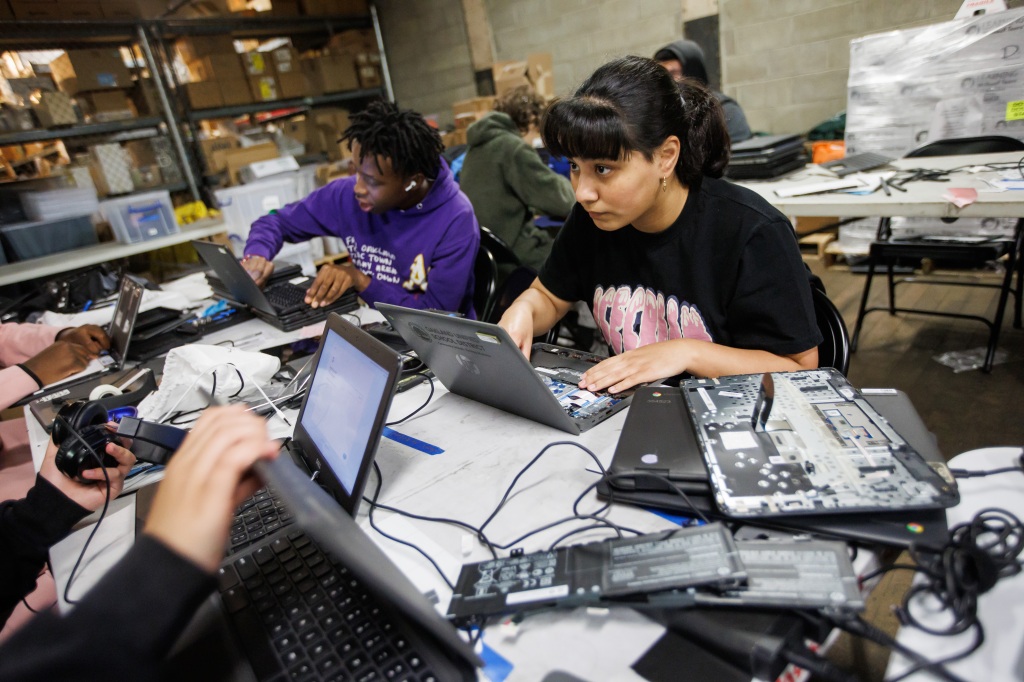There are few things quite as emblematic of late stage capitalism than the concept of “planned obsolescence”.
Why are schools pushing so hard for enslaved Linux laptops?
Easier to manage for IT would certainly be my bet, and appealing cheap contracts. Even those Acer Aspires so many schools used were double the price of these Chromebooks, so suddenly youre talking about nearly halving a ~$100k cost. Schools want things locked down and enslaved, they couldn’t care less that they are Linux under the hood. They don’t think like you and I.
Yep, this is it. I volunteered for my school’s IT department in high school, this was basically the logic. The laptops are cheap and easy to manage/administrate. Whether or not they were Linux was a non-issue.
Edit: also, since chromeOS is basically just a browser, there wasn’t much that could break, and if something did break everything was stored in google drive anyway, so you could just factory reset the device and hand it back to the student without needing to buy any kind of higher-level support contract.
Right? It’s basically short term thinking on the school’s part.
Chromebooks expire? What the fuck? Are there logistical problems with installing Linux on these devices?
I think its more that Google supports them for only so long and then they go bitrotten. The final update for these devices should also unlock the firmware so people can wipe the device and install Linux or something on it.
the Chromebooks with ARM processor (the majority of the cheaper ones) are notoriously known to be awful to install any alternative operating system
Not really, but it’s almost impossible for a school to pull that off and still get the support needed. Don’t forget that new Chromebooks are dirt cheap, after all discounts probably in the 100-200$/€ range. It’s (sadly) just not worth it salvaging them.
Chromebooks are unfortunately meant to be disposable like phones. Nobody should buy one, but unfortunately schools get them because they’re cheap.
On an individual basis you can install Linux, but for millions of devices thrown out by schools around the world, there’s no solution because the residual value is so tiny, you’d have to pay the techs minimum wage and hold a gun to their heads to get enough devices per hour to justify it.
I used to work at a refurb place and when we saw a chromebook that wasn’t immediately OK (it could’ve had a bad display or keyboard, or locked to an account), we just removed the eMMC, smashed the chip and threw the device on our scrap pallet.
Phones shouldn’t be disposable either, I’m coming up on five years on mine.
They shouldn’t be, but they’re designed to be, especially Androids with their abysmal software support period.
I guess mine is unusual then. I still get very regular security updates, and battery life though noticeably shorter, well, it’s still okay.
Is there something preventing the use of ansible or similar, to handle the installs?
Ansible probably doesn’t change UEFI settings or switch off the hardware lock that some Chromebooks have for installing a new OS.
You have to remember that these things cost like 200 USD new and they’re utterly underpowered. By the time they stop getting updates, they have so little residual value, it’s literally not worth salvaging them.
Give them to the kids with a QR code guide sticker about installing Linux on them? I’m not a kid, but I would love if someone “threw” a couple of these in my general direction.
Almost certainly not allowed, schools are responsible for privacy and security on these devices.
Any standard desktop linux is more private and secure than google spyware
And as soon as the IT guy at school installs Linux on these machines, he’s responsible for said privacy and security. And he’s a lot easier to sue than Google if something goes wrong.
This is exactly why right here, cost aside.
I would not hand out hundreds of Chromebooks to kids running some Linux distro I installed even if I could. It’s critical to have full manufacturer support in these types of environments.
Yes but there might already be personal data on them from the child, so they cannot give the chromebooks out before wiping them, which seems hard to do so they just bin em.
Most of these Chromebooks are 3-4 years old and in really rough shape. Kids use these things for literally everything. You likely wouldn’t even want them for free. Probably bio-waste at this point.
A friend asked me to fix their daughter’s desktop and also asked if she could borrow an old laptop to use in the meantime. The desktop was disgusting with food smeared all over the keys and display. I cleaned it up and fixed it and sent it back. My laptop was returned with food smeared everywhere after just a few days. I was stunned.
Planned Obsolesce should be a crime
I would have agreed with that statement until I saw the most recent Technology Connections video about why the incandescent light bulb has planned obsolescence built in. Sometimes it’s not malicious but to actually provide a compromise leading to an overall better product.
I don’t think software death dates count, tho.
Light bulbs aren’t planned obsolescence though, he even said as much in the video, light bulbs more akin to dish-soap which eventually runs out then a device made to be obsolete faster. They are consumable items, which run out or burn out, they are not expensive appliances with long lives, hell he even pointed out that some utilities gave them away for free.
TLDR: I’m still very suspicious of how that is quantified - “leading to an overall better product”.
Who quantifies that and how, on a case by case basis, especially in the form of Chromebooks or phones for revenant, popular examples?
Let’s say it was a laptop: I can see issues with lithium batteries perhaps reaching a cycle count that lead them to be dangerous. Wouldn’t that mean though you should produce a good that has replaceable batteries? Is the battery designed in such a manner on purpose?
Businesses with shareholders that live quarter to quarterly profit are the issue. There is no authoritarian legislator that reallocates resources like China did the last few years, for example, whether you like it or not.
The US relies on legislation to be passed to mandate the changes or prohibit a device from being built a certain way. That legislation can be lobbied for loopholes, have various people in power also own percentages of the companies, etc. Whether you agree with it or not, there are many checks and balances and simultaneously a lack thereof.
but to actually provide a compromise leading to an overall better product.
Could you elaborate a bit more on that?
For incandescent lightbulbs, his point was that bulbs can burn fast and bright or low and slow, and standardizing on a lifespan of 1000 hours was a sweet spot between performance and longevity. For example, it makes 60W bulbs from different manufacturers more interchangeable and less prone to tricky marketing gimmicks like a “long life” 60W bulb that’s dimmer.
Thank you for explaining this concept. I still don’t see how it can be considered planned obsolescence, though. It looks more like a matter of optimizing the output and doing a tradeoff for more performance.
I see planned obsolescence as artificially limiting the longevity or repairability of a product, without any benefit at all, but with the intention of making it less durable. A good example could be locked smartphones without updates.
But perhaps, the definition of planned obsolescence is broader than i think.
That wasn’t planned obsolescence though, it was an industry-created standard for the tradeoff between efficiency, brightness, and lifespan. Planned obsolescence is specifically when a product is made to break sooner than it needs to.
Software Death Dates strike me as more “Malware” than “Compromise”
I agree that this is very bad on google’s part of course, however I don’t think the schools should just lie down and take it. As others have said, installing their own OS should be the way to go. It doesn’t need to be 1 person manually installing the OS on each laptop, there are Infrastructure automation tool like Ansible that can, once set up, manage installation and configuration of an arbitrary number of devices. All the device needs to do is launch a web browser from what I understand, and pretty much every linux distro should be able to do that. If they choose one with a friendly DE, then it makes it easier to use for the kids. The devices will most likely run much better on an OS without bloatware too.
Comments upon comments ignorant of the realities of the privacy laws governing this domain and the implications on firmware, driver and OS security support. “Just install Linux on it” is a completely unworkable solution. As some have pointed out, the places where this is done have a much thicker IT departments staffed with higher grade professionals to make it work. The thing to be mad here about is the shit support from vendors across the stack. If I had to guess, the worst offenders are probably the SoC vendors who typically ship firmware and driver updates as is the tradition.
deleted by creator
That’s exactly the problem. The standard GNU/Linux distro isn’t suitable to allow carrying the responsibility that an innumerable number of users with physical access won’t be able to pwn those machines. Machines that are used by others too. You absolutely can make an OS like that out of Debian or Ubuntu, or what have you. Google has - Chrome OS - but it’ll take a significant development effort. You’d have to basically redo at least some of the work they’ve done. And let’s say you did all of that. Then you end up deploying it on an ARM-based fleet. And there’s a wild vulnerability in the WiFi firmware blob, and the SoC vendor no longer supports it. Every student has root and we’re back to the original problem. 👨🚀🔫
And that’s why instead of getting hardware from a vendor and hoping for the best, you might want to get it in writing that they’ll support their crap till a date. Then you stamp that as the EOL date for that laptop and you present it as part of the spec to whoever might want to buy this laptop. There’s no escaping this problem unless there are no proprietary blobs on the system, which is unlikely for ARM, or you have a solid development team and you’re large enough to have a source sharing contract with the vendor that lets your team fix the vulnerabilities and support the hardware for as long as you like. It’s probably much easier to achieve on x86, which costs more per unit up front.
Thank you for sharing your experience along with that link.
I am actually curious as to how you would make a locked down managed linux OS akin to ChromeOS.
Because Linus Torvalds stupidly refused to change the Linux license to GPL3.
What difference would the kernel licence make in this context?
Yeah, bulk imaging computers is really only limited to how many you can hook up to the network. I used to have to image hundreds of computers a day at times, and really the longest part was walking around and restarting them all so they’d PXE boot. The actual process maybe took 2 hours since all the computers were on 100Mb/s connections.
I converted one of these Chromebooks to Linux as a test project and the results were, not good.
To start, they have a bootloader lock screw under the motherboard, so you have to take the entire laptop apart to load anything but unsupported ChromeOS.
Then you have to use a Google tool, can’t remember the specific one, to swap the bootloader. That might be possible to automate but I didn’t look into it because…
… The hardware sucks. We’re talking like 4GB of storage on a lot of these Chromebooks. The driver support is all over the place, and there are issues everywhere even on “supported” distros.
With the vast amount of junk Chromebooks out there, I’m sure community hospice support will get better, but it’s never going to be an easy bulk conversion because of how common the bootloader locks are.
I agree that this is very bad on google’s part of course, however I don’t think the schools should just lie down and take it. As others have said, installing their own OS should be the way to go. It doesn’t need to be 1 person manually installing the OS on each laptop, there are Infrastructure automation tool like Ansible that can, once set up, manage installation and configuration of an arbitrary number of devices. All the device needs to do is launch a web browser from what I understand, and pretty much every linux distro should be able to do that. If they choose one with a friendly DE, then it makes it easier to use for the kids. The devices will most likely run much better on an OS without bloatware too.
The service life of the devices was known up-front. You can check for yourself the service life dates of every Chrome OS machine here:
https://support.google.com/chrome/a/answer/6220366?hl=en
The correct deployment strategy would be to make a big purchase at the front end of a device’s lifecycle and then only replacements from then on out so that you get the most out of every machine. Future capital purchases would be with a new device and termination date.
I think this point is really important, and allow me to go one step further: I work in the public sector of education and purchasing technology is such a complex issue that IT governance has to be involved with decisions like this. That’s to say that, without a governing body to review purchases (outside of whoever handles the actual procurement, i.e. funds leaving the bank account), mistakes like this will happen.
We can be upset with planned obsolescence, but there’s distinctly a human error here where there wasn’t enough research and planning.
Anyone got a non-paywalled version of the article?
If you are on ios device, using safari, tap the link and, you have to quick, tap the AA at the far left corner of the safari search (URL bar) while page is starting to load.
Sorry! I didn’t realize it was paywalled because I could see the whole thing. Hopefully this should work:
Hmmm, I too could see it fine. Could be region-based.
All of these machines make for decent Linux laptops. I picked up an EOL Chromebook for $35 last year and installed Debian on it. Decent little machine. Not terribly fast but very useable.
Good to know. Is it still a PITA to make the firmware let you change the OS?
Mine was really easy (dell chromebook 11), just followed the instructions and I had no problems. I have another chromebook with an amd chipset that I can’t change the firmware on though (last time I checked), so if you’re planning to buy one to convert make sure you actually can do it first.
Most modern ones it’s just commands you have to run. You can usually find an easy walk-though on the MrChromebox website. I haven’t seen one that required a jumper or anything in a LONG time.
These are Linux laptops. But yes, they’ll work better if you put your preferred distro on them.
I turned one into an Emacs machine, it was £20 and I fucking love it. It’s built like a tank too. It’s a dell Chromebook 11.
deleted by creator
I manage my schools IT - and when we started out a few years ago my board were pushing aggressively for Chromebooks. The service provider were talking about how they could roll out hundreds of Chromebooks at the touch of a button. When I asked about the lifespan of a Chromebook I got vague answers. I knew we would get a couple of years max out of each one so I instead pushed for much more expensive MacBooks. 5 years on and we are still using our original MacBook we got back then, with photoshop and other software.
I’m curious how something like Framework laptops would pan out for this use case. New they are currently priced similarly to a macbook, but in theory they are indefinitely serviceable.
This is true! And you also don’t have to worry about the proprietary-ness of MacOS, and there are also (certain ways)[https://github.com/Gictorbit/photoshopCClinux] to get photoshop on Linux too.
Framework laptops are the exact opposite of what you’d want in a school environment. This is how you blow your schools IT budget out the window. Cheap, disposable, consistent configuration and manufacturer supported are the key concerns.
These are kids with various standards of computer literacy throwing them in their bags which they also kick around and treat pretty harshly all day long. A $4k Framework-style laptop is just silly.
My comment is in the context of someone who said they’re 5 years into their plan of buying MacBooks instead of cheap Chromebooks and they’re still happy with their decision. If they had said reality panned out as you suggest, then yeah, my comment would make less sense.
But then again, in theory, the more damage the laptops are going to suffer, the more you’ll save over time if they’re easily repairable
Also, you’re right that $4k for a framework is ludicrous. I was thinking more like $1500. But idk what MacBooks OP purchased.
Yeah, I don’t understand who’s buying these at all at that price to be honest. I’m not sure if its the profit margin they want or production-related issues due to the low number runs they’re probably doing.
Not necessarily! The Chromebook version starts at 1k, with a no-OS one 50 below that, both pre-assembled. Additionally, the higher build quality with the ease of part replacements would significantly reduce the load when it comes to repairs. The downsides of course are the high up-front cost, but this could be reduced by releasing in groups (by grade level, for example.) Also, an advantage with unrestricted devices like this is that it’s very easy to flash/install whatever you want, including whatever user permissions and applications are needed to ensure smooth operation (e.g. specific DNS/VPN configuration for content blocking or access to school materials.)
Either that, or I’m speaking out my ass. Still though, there’s a lower carbon footprint involved when you don’t need to huck the whole device in the trash once something breaks. That should at least be some kind of incentive…
You can buy 2-3 cheap Chromebooks for that which will theoretically last 10-15 years though for your $1k. Basically no schools are going to turn that up vs a $1k Framework most of which will not last half that long with kids using them.
Sucks for the environment though as you say, I wish it were different.
Ironically the only way to use some old Macbooks these days is to put Chrome OS Flex on them. Apple is far more aggressive about killing off old hardware when it feels like it. You can still use them as-is of course but over time the browser and other web based apps degrade and refuse to work because of issues with TLS, CA certs (expired), discontinued backend APIs and unsupported web content APIs.
I have a 2015 fully specced 15" MacBook Pro that I’m trying to sell at the minute, which is proving more difficult than I thought it might, partly because the M-series Airs are so compelling, but also because it’s an incredibly powerful machine that’s officially locked to Monterey, which is now two years old.
Beyond Apple’s need for financial gains, I don’t think there was a compelling reason to leave that model out of the Ventura upgrades.
I had it running Ventura via OCLP, which it had absolutely no trouble with at all. But I can’t sell it in that state because while it’s pretty stable, there is still some extra fiddling needed with running an unsupported OS.
Monterey still gets security updates. :)
But they’re not as fun as feature updates!
For me issues have only really started around the 5-8 years mark depending on the device which is ok-ish since the hardware is extremely outdated then anyway.
x86 Macs are not the greatest example of longevity at this point.
Not ideal that we had a percentage of our MacBooks on x86 cpus when the M1’s came out. But I will say they are still running strong. Others have pointed out that newer OS updates won’t work on the older MacBooks. But that’s not a deal breaker for us as we don’t run anything that’s OS specific enough to make the older models obsolete. We have factored in 5 - 7 years of use out of the laptops and we’re on course for that. I myself and using a 10 year old MacBook at home, and although I can’t fire up the latest Adobe Premiere on it, I can certainly get 99% of my work done on it.
Really? I just handed down a 2017 MacBook Pro – still supported by Apple, meaning it runs the latest OS, and gets patches.
Can you give me an example of any other device with longer software support from the original vendor, at no cost to the end user?
Those are great for hosting a Ubuntu server (as long as they are not CPU intensive). You can buy a dongle to connect it to the router for Ethernet, then add a SD card or connect a hard drive by USB and it’s quite solid. There’s a few tweaks needed but it’s an incredible learning experience.
Awful!!! I remember using those junktops when I was in high school…
Made me realize I still have one lying around and I tried to put Linux on it, but they seem to only let you sandbox Linux in it…? Not able to enter BIOS supposedly due to the firmware is obnoxious. Is there any way to put coreboot on over the firmware or something?
At a guess - they’re likely selling those laptops at a loss and making the money back on (hopefully) service contracts or (probably) selling your data. As soon as you install a custom OS they won’t support you (so you won’t buy support) and they won’t be able to sell your data.
That doesn’t really add up. If they would sell them at a loss, they would want you to use them as long as possible.
Sorry for the late response, I’ve been wading through my inbox to get back to most :)
That’s gotta be why they make it so damn hard to uninstall ChromeOS… I like that Linux is being popularized more, but I hear whispers from the F(L)OSS community in my head that Canonical and Microsoft are one in the same. Its a bit confusing some of the rhetoric surrounding certain companies and software other than the blatantly obvious like Microsoft or Google, but I’ll never quite understand programmer “martian”…
Have you worked on chrome books before and swapped the OS?
Most Chromebook’s firmware is Coreboot, but it’s running a Depthcharge payload instead of UEFI (or BIOS or whatever). Mr. Chromebox maintains UEFI Coreboot payloads and install tools for a wide variety of (x86) Chromebooks, which can be used to flash a normal UEFI payload and boot normal OSes. It’s strictly possible to boot normal Linux systems on a the Depthcharge payload modern Chromebooks use, but uh… here’s the gentoo wiki on it, it’s a substantial pain in the ass.
Yep I did that to my school Chromebook, they never asked for it back when I graduated and being a broke college student I decided to UEFI flash it and use it as a cheap Linux Computer, still using it now. It’s not the fastest laptop but it’s certainly good enough. It’s really dumb that they enforce software expiration dates on these PCs when they’re probably fully capable of running the next version perfectly fine.
Not Chromebook related, but I have an Asus G72GX laptop from around 2010 I bought refurbished, it was meant to be used for gaming, but it’s performance wasn’t very good. Got married, life happened and finally dug it out of storage this year. Replaced battery, installed windows 10 (had 7) and started using it for work as a developer. It handles it remarkably well considering it’s age.
I had to force windows 10 to install by jumping through all kinds of hoops, but I haven’t noticed a difference in it’s performance.
However, if I reboot, I often get stuck in a boot loop with a different error each time it reboots, but I somehow magically get it to the login screen by doing some kind of computer version of the Konami code, except I don’t know what the code is.
That being said, I am curious if It would be more beneficial to install Linux. I have no experience with it. All I use it for is VSCode mainly.
I never tried using WIndows on my Chromebook before, heard that it really performs badly on Chromebook hardware. You might have better luck with Linux if the error is happening in Windows so it might be worth giving it a shot.
Apologies for the long wait for a response. Been trying to get back to people.
I checked out the Chromebook I have and made a post on the Gentoo form, but don’t believe I’m able to do it for my particular model because of how I’m sandboxed in a subsystem of something. Could I DM you and we could chat more about sending Chrome OS to the shadow realm?
Sure, drop me a note with the details and I’ll see if I can give you a hand. I’m not super expert in all the specifics of the Chromebook ecosystem, but I have good general computer/Unix skills and have hacked a couple so I know where to look for resources.
Awesome! I’ll send you a DM a bit later with some details about the Chromebook when I dig through the mountain of stuff in front of me. Appreciate the help :)
After reading all the comments, I’m just gonna say that if you don’t allow kids to tinker and do their thing, they will learn a lot slower and your “investment” will be left mostly unused. (age range proper hardware/OS of course.) The school policy is not doing the kids a favor, it’s a waste of time and tax money that you cultivate a generation of people get used to chrome book and google apps. That’s the ultimate purpose for school license being cheaper.
We’ve got young adults entering the workforce that cannot comprehend what a filesystem and directory structure is due to 10+ years of these sandboxed, guard-railed tech products.
I now understand that existential crisis that people become too dumb or not capable of operating technologies developed by previous generation.(like the Walle movie.)
My 15 years old Linux laptop can still do everything (except gaming new titles)
Pffft… I can’t even get a laptop battery to last that long.
Companies making mass market devices should be required by law to support them indefinitely, or until they publish the technical specs sufficient for community support and repair.
The upgrade cycle they’re allowed to get away with today is not only a ridiculous drain on people’s money, but also a shameful source of pollution and waste.
until they publish the technical specs sufficient for community support and repair.
I want to see phones with no further official OS support have their boot loaders opened up so a lightweight OS can be installed on them instead. I’ve had iPhones in the past that have been absolutely rock solid after a battery replacement that lost iOS support, and with that a whole bunch of resale value. So I now tend to sell mine a year or so before they’re likely to be dropped.
But I genuinely think that I’d hold on to an iPhone that could have an alternative OS installed. This is, of course, why none of the major manufacturers allow this. Gotta put the profits ahead of the ethics.
Exactly, bootloader locking should be downright illegal. If EU wants to make phones last, they need to mandate that you can unlock the bootloader (WITHOUT bullshit like having to get an unlock code from the manufacturer). Want to lock it down for certain software features like payments, etc? Ok, fine, I can live with that, so long as I can unlock it if I so choose and keep all HARDWARE functionality intact.
On another note, the manufacturers should be upstreaming and mainlining their drivers in the Linux kernel. ChromeOS and Android are both built on Linux, yet they keep all their hardware support in forks and branches that are left to wither and die rather than submitting those changes upstream. Only a select few ARM SoCs have mainline support. If the companies would just put a bit of extra effort into doing things right rather than the shitty hack jobs they do now to get products out the door as fast as possible, we could have a much better ecosystem around old phones. Of course, the shittiness is by design.
Actually in the Android community Sony helps you unlock your bootloader and offers official AOSP sources for their devices that you can compile and install yourself.
I have no idea why people are enamored with Samsung.
Ad campaigns, most likely. I always seem to see ads for Samsung phones, but not as often for Sony brand ones. I do agree Sony does a much better job about opening up the bootloader, versus Samsung punishing you for trying to open your own paid for device up.






















